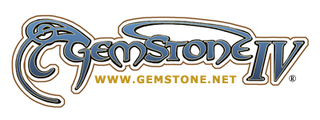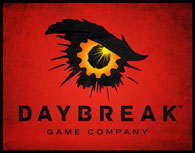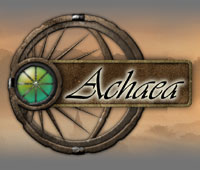Related Research Articles

EverQuest is a 3D fantasy-themed massively multiplayer online role-playing game (MMORPG) originally developed by Verant Interactive and 989 Studios for Windows PCs. It was released by Sony Online Entertainment in March 1999 in North America, and by Ubisoft in Europe in April 2000. A dedicated version for macOS was released in June 2003, which operated for ten years before being shut down in November 2013. In June 2000, Verant Interactive was absorbed into Sony Online Entertainment, who took over full development and publishing duties of the title. Later, in February 2015, SOE's parent corporation, Sony Computer Entertainment, sold the studio to investment company Inception Acquisitions and was rebranded as Daybreak Game Company, which continues to develop and publish EverQuest.
A MUD is a multiplayer real-time virtual world, usually text-based. MUDs combine elements of role-playing games, hack and slash, player versus player, interactive fiction, and online chat. Players can read or view descriptions of rooms, objects, other players, non-player characters, and actions performed in the virtual world. Players typically interact with each other and the world by typing commands that resemble a natural language.
DikuMUD is a multiplayer text-based role-playing game, which is a type of MUD. It was written in 1990 and 1991 by Sebastian Hammer, Tom Madsen, Katja Nyboe, Michael Seifert, and Hans Henrik Stærfeldt at DIKU —the department of computer science at the University of Copenhagen in Copenhagen, Denmark.
The MUD trees below depict hierarchies of derivation among MUD codebases. Solid lines between boxes indicate code relationships, while dotted lines indicate conceptual relationships. Dotted boxes indicate that the codebase is outside the family depicted.

GemStone IV is a multiplayer text-based online role-playing video game produced by Simutronics. Players control characters in a High Fantasy game world named "Elanthia". The first playable version of the game was known as GemStone ][ and was launched in April 1988 on GEnie. It was one of the first MMORPGs and is one of the longest running online games still active. Access to the game is subscription-based through its website, with three additional subscriptions levels available, "Premium", "Platinum" and "Shattered", in addition to a free-to-play model introduced in early March, 2015.

Daybreak Game Company LLC is an American video game developer based in San Diego. The company was founded in December 1997 as Sony Online Entertainment, a subsidiary of Sony Computer Entertainment, but was spun off to an independent investor in February 2015 and renamed Daybreak Game Company.
Player(s) versus player(s), better known as PvP, is a type of multiplayer interactive conflict within a game between one versus one player. This is in contrast to games where players compete against computer-controlled opponents and/or players, which is referred to as player versus environment (PvE). The terms are most often used in games where both activities exist, particularly MMORPGs, MUDs, and other role-playing video games. PvP can be broadly used to describe any game, or aspect of a game, where players compete against each other. PvP is often controversial when used in role-playing games. In most cases, there are vast differences in abilities between experienced and novice players. PvP can even encourage experienced players to immediately attack and kill inexperienced players. PvP is sometimes called player killing.
A persistent world or persistent state world (PSW) is a virtual world which, by the definition by Richard Bartle, "continues to exist and develop internally even when there are no people interacting with it". The first virtual worlds were text-based and often called MUDs, but the term is frequently used in relation to massively multiplayer online role-playing games (MMORPGs) and pervasive games. Examples of persistent worlds that exist in video games include Battle Dawn, EVE Online, and Realms of Trinity.

Raphael "Raph" Koster is an American entrepreneur, game designer, and author of A Theory of Fun for Game Design. Koster is widely recognized for his work as the lead designer of Ultima Online and the creative director behind Star Wars Galaxies. From 2006 until 2013 he worked as the founder and president of Metaplace producing a Facebook game platform.

Richard Allan Bartle FBCS FRSA is a British writer, professor and game researcher in the massively multiplayer online game industry. He co-created MUD1 in 1978, and is the author of the 2003 book Designing Virtual Worlds.
The Realm Online, originally known as The Realm, is a massively multiplayer online role playing game (MMORPG) launched in December 1996 for Windows PC. It was designed in the tradition of graphical MUDs, before the usage of the terms "massively multiplayer" and "MMORPG".
PvE, player vs environment, is a term used in online games, particularly MMORPGs, CORPGs, MUDs, and other online role-playing video games, to refer to fighting computer-controlled enemies—in contrast to PvP.
A mob, short for mobile, is a computer-controlled non-player character (NPC) in a computer game such as an MMORPG or MUD. Depending on context, every and any such characters in a game may be considered to be a "mob", or usage of the term may be limited to hostile NPCs and/or NPCs vulnerable to attack.

Achaea, Dreams of Divine Lands is a roleplay-focused, text-based multi-user dungeon (MUD) released on September 9, 1997. It was published by Achaea LLC, now known as Iron Realms Entertainment. Achaea is operated by collecting the revenue through a microtransaction system, which allows payment for the acquisition of in-game benefits.

The Bartle taxonomy of player types is a classification of video game players (gamers) based on a 1996 paper by Richard Bartle according to their preferred actions within the game. The classification originally described players of multiplayer online games, though now it also refers to players of single-player video games.
The history of massively multiplayer online games spans over thirty years and hundreds of massively multiplayer online games (MMOG) titles. The origin and influence on MMO games stems from MUDs, Dungeons & Dragons and earlier social games.
TinyMUCK or, more broadly, a MUCK, is a type of user-extendable online text-based role-playing game, designed for role playing and social interaction. Backronyms like "Multi-User Chat/Created/Computer/Character/Carnal Kingdom" and "Multi-User Construction Kit" are sometimes cited, but are not the actual origin of the term; "muck" is simply a play on the term MUD.
DGD, Dworkin's Game Driver, is an LPMud server written by Felix A. "Dworkin" Croes. DGD pioneered important technical innovations in MUDs, particularly disk-based object storage, full world persistence, separation of concerns between driver and mudlib, runtime morphism, automatic garbage collection, lightweight objects and LPC-to-C compilation.
Imaginary Realities (IR) is an online magazine dedicated to text-based gaming, from MUD and roguelikes to interactive fiction. The original Imaginary Realities magazine was an influential MUD community online magazine running from September 1998 to December 2001. The current incarnation of the publication was started by Richard Tew in December 2013 and had until September 2015 released five new issues under a Creative Commons Share-Alike license.
References
- ↑ "SOE Acquires Assets of Worlds Apart Productions". Archived from the original on 2006-08-22. Retrieved 2007-01-18.
- ↑ "Skotos.net Forums: Sony bought Worlds-apart" . Retrieved 2007-01-18.
- ↑ "Celebrating TEC's Fifteenth Anniversary" . Retrieved 2011-01-12.
- ↑ "SOE closing studios, cutting 205 staff" . Retrieved 2011-03-31.
- ↑ "The present and future of Grendel's Revenge" . Retrieved 2012-02-12.
- ↑ "Skotos Tech Acquires DGD License" (Press release). Skotos. 1999-02-05. Retrieved 2010-04-18.
- ↑ Croes, Felix (2010-04-02). "Dworkin's Game Driver - Open Source Release". SourceForge. Retrieved 2010-04-18.
- ↑ Skotos Tech Inc. (May 2000). "The Skotos Proximity System". Imaginary Realities . Archived from the original on 2002-01-13. Alt URL
- ↑ Appelcline, Shannon (2002-03-04). "Announcing Story Points". Skotos Forums. Skotos. Retrieved 2010-04-20.
- ↑ Bartle, Richard (2003). Designing Virtual Worlds . New Riders. p. 37. ISBN 0-13-101816-7.
Neither is it surprising that the best informative and speculative articles about virtual world design are being written for—and made publicly available for free by—a company specializing in immersive text-based worlds, Skotos.
Bartle, Richard (2003). Designing Virtual Worlds . New Riders. p. 61. ISBN 0-13-101816-7.Perhaps the best expression of this difference is seen in the comparison between the early advertising slogans of Verant (makers of EverQuest) and Skotos (makers of Castle Marrach)): * Verant: You're in Our World Now. * Skotos: Why Yes, I am God. Skotos' games have only a fraction of the players that EverQuest has, but their slogan sells more T-shirts.